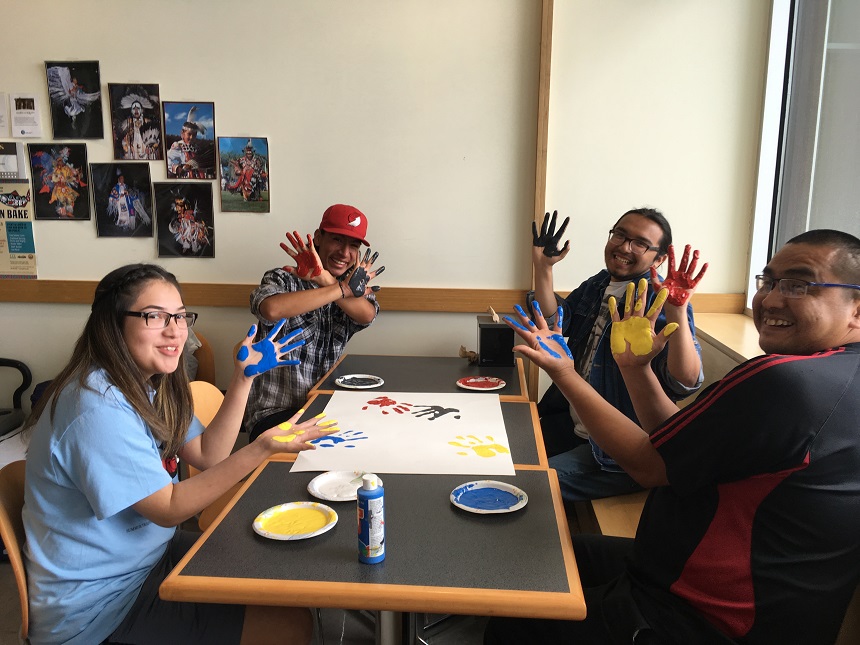Previewing College with a Cultural Lens
April 1, 2023
For Latinx, Native American and Black high schoolers, COCC’s free college prep summer programs, held in June, provide academic closeups with a focus on heritage — apply now
A grass fire moves hungrily across the brittle landscape on Maupin’s outskirts, spreading
like a spilled substance over the basalt plateaus and open country. It’s a frightfully
early start to fire season — just the beginning of summer — and more than 300 personnel
have geared up to knock down the fast-rolling Boxcar Fire.
Ninety miles south, at Central Oregon Community College’s (COCC) Bend campus, the
morning dawns platinum blue, absent of a trace of smoke. Well, almost.
Inside a classroom in the Ponderosa building, a group of 15 high school students,
all Native American youth, are circled around a tabletop model of a town, complete
with streets and little buildings, where a small tuft of grayish cotton puffs like
smoke from a pint-sized house. Toy fire engines have already converged on the scene.
“We run all kinds of ‘sims’ on that,” explained Paula Simone, program director for
COCC’s Structural Fire Science and Wildland Fire Science departments, as the students
lean in and examine the scale model. A few reach out to touch the miniature world.
Firefighter students, she tells them, will map out response tactics and urban challenges
with the model, utilizing a software interface to run different simulations. “There
are so many opportunities you can branch off into in this field,” said Simone, planting
inspiration as she gives an overview of the college’s Fire Science programs and degrees.
Inspiration is fundamental to this gathering. The students are part of COCC’s Summer
Training to Revive Indigenous Vision and Empowerment program, or STRIVE, a four-day symposium that gives regional Native American teenagers a close view
of college life and opportunities, and, potentially, a better-defined path beyond
high school.
Similar programs for Latinx and Black students, Ganas and Ubuntu, respectively, take place at the same time. (All programs are in fact open to any
high schooler, not just these specific identity groups.) Attendees earn a college
credit to put their higher educations in motion.
They stay on campus in Wickiup Residence Hall, becoming acquainted with COCC’s career-starting
programs. From Nursing to Culinary to Forestry, students meet faculty and hear from
college-enrolled peers. They try on firefighting gear, peer into microscopes and brainstorm
business ideas.
With a schedule that emphasizes culture, participants honor their own heritage through
a series of projects and fieldtrips, culminating in a final presentation to families
and college leadership. STRIVE, for instance, holds discussions on language reclamation
and how college can present unique challenges to Native Americans.
“There will be some overlap in the agendas, but our celebrations and a few classes
will each have a specific affinity in them to discuss cultural issues, representation,
cultural pride, those kinds of things,” explained Marcus LeGrand, Afrocentric program
coordinator, who directs Ubuntu.
Israel Tico, a first-generation Latinx student, participated in both Ganas and ¡AVANZA! (the embedded high school counterpart) through Bend Senior High before enrolling
in COCC’s graphic design program. “These programs encouraged me forward because they
helped me learn about the different aid resources for students, such as scholarships
and student loans, and not only that, but I also had the opportunity to learn how
the educational system works,” he shared.
The impact is significant. In 2021, 100% of the program’s participants graduated high
school — a year when Oregon’s high school graduation rate dropped to 80.6%. And that
year, 100% of Latinx students went on to college or trade school, while 75% of Native
students enrolled in college or a trade school.
Ubuntu, which launched last year, is aiming for similar stats. It started with six
students and two mentors in 2022 but expects to grow thanks to its high school-embedded
program, L.E.A.D., which now has 32 students on board. “I’m looking to have at least 20 to 25 students
attend this year,” said LeGrand.
Back in Paula Simone’s Fire Science class, she shared with the STRIVE students that
she banked $3,600 in two weeks of fighting wildland fire one summer. It got their
attention. As some of his peers wriggled into fire gear behind him, a young Native
student studied a collage of wildland firefighting images. “There’s a lot of interesting
things here,” he said. “And this is one of them.”
Discover the many interesting things available at COCC — apply now. This year’s STRIVE
and Ubuntu programs will be held June 26-29, while Ganas takes place June 27-30. Applications
are accepted on a first-come, first-serve basis. To apply and learn more, visit cocc.edu/multicultural or contact Christy Walker, COCC’s director of diversity and inclusion, at cwalker2@cocc.edu or 541-383-7412.
Image: Students of STRIVE participate in a cultural exercise.
By Mark Russell Johnson, staff writer, Office of Marketing and Public Relations

